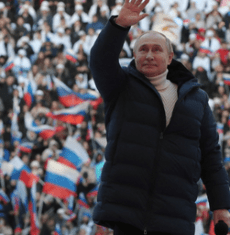Don’t get me wrong, it wasn’t the food that was hopeless. Like all worthy men, our host did all the cooking, and, like all worthy men, he did it well.

It’s just that somewhere between the roast capon and the cheese board I lost, along with the will to live, whatever little hope I still had for the West. That had to do with the husband and wife eating on either side of me.
During the Medvedev tenure as figurehead president, the man served as ambassador of a major European country to Russia. Now retired from the diplomatic service, he sits on an influential advisory board to his country’s government.
He and his wife both fell in love with Russia, and they even learned its language to a decent standard. Now they were sorry Putin had spoiled what otherwise had been a perfect reign.
My probing questions established that, according to my interlocutors, until 24 February, 2022, Russia had followed an ever-ascending path to democratic virtue. The ex-ambassador couldn’t for the life of him understand why Putin had had to go and mess it all up.
That tragedy had happened all of a sudden, completely unexpected, he said. Well, I had expected it, said I smugly. Just look at Putin’s CV both before and after he assumed power.
“What about it?” “Well, to start with, he is a career KGB officer.” “So? Americans have their CIA, which is just as bad.” “Not quite, I’m afraid. I’m not aware of the CIA murdering millions of their own citizens.” “It was the Communist Party that did that, not the KGB.”
“Now, Putin started his tenure by having several apartment blocks blown up in Moscow and elsewhere. When the tenants were sleeping in their beds.” “It’s not proven Putin had anything to do with it.”
“And then he started the second Chechen war, killing civilians indiscriminately.” “The Chechens are nasty bits of work. They had it coming.”
“Then there was that little matter of Russia attacking Georgia in 2008.” “Russia did nothing of the sort. It was Georgia that attacked Russia.”
“Did the Ukraine also attack Russia in 2014?” “Nobody attacked anyone then. Russia merely claimed what was historically hers, the Crimea.”
“So did all those journalists and politicians murdered by Putin in fact commit suicide?” “Nobody was killed while we were in Moscow.”
At that point I started reeling off the names of Putin’s victims, and a good job I could remember quite a few. Otherwise my interlocutors would have denied everything, like a criminal who refuses to admit to any crimes, other than those the police can prove he committed.
“Politkovskaya?” “Oh yes, I remember now.” “Estremirova?” “Quite, I forgot about her.” “Baburina? Starovoytova? Shchekochikhin? Nemtsov?” And so forth, with each name wrenching reluctant admissions and so-what shrugs. Clearly that litany made no dent in my interlocutors’ affection for President Medvedev and, until 24 February, President Putin.
“But Medvedev was never a real president. He and Putin simply concocted a cynical ploy to bypass Russia’s constitution. Putin had to relinquish the post for a couple of years not to have too many consecutive terms, but he still called all the shots.”
“No, he didn’t. I met Medvedev quite a few times, and he was firmly in charge. And a fine man he was too.”
“He was a KGB thug, just like his master. I once saw a video of a drunk Medvedev ranting about the Arab Spring, saying if he were Mubarak he would have turned it into a nuclear winter. Practically every word was the kind that even my late mother never knew.”
“Impossible. Medvedev doesn’t swear. He has a doctorate in law.”
“So you disagree that Putin and his regime are evil and fascist?” “Of course, I do. He is like any political leader, getting some things right and some others wrong. Once this little conflict is settled, things will go back to normal, and Russia will resume her march to goodness. And in any case, the word ‘evil’ has no use in politics. It’s just too extreme.”
“What about Hitler?” “Well, except him. But you aren’t suggesting Putin is as evil as Hitler?” And so forth, way past the cheese board and even the chocolate mousse (homemade).
Why am I bothering to tell you this story?
Because my (otherwise charming and perfectly civilised) interlocutor embodies within his lofty frame the entire political mainstream of his country and other EU members, at least in the high-rent end of the Union.
They can’t wait for some sort of ceasefire, bogus or otherwise, to go into effect in the Ukraine. Then they’ll be able to race against one another to the honour of being the first to repeal all the sanctions and readmit Putin to… well, any organisation he’ll wish to be readmitted to.
Errare humanum est, and all that. Attacking the Ukraine was a mistake, but can you name one politician in history who was never wrong? Now things are going back to normal, goes the refrain. The words ‘until next time’ are never uttered, nor even thought.
And what about those thousands of dead Ukrainians, millions driven out of their homes and even their country, smouldering remnants of cities, children orphaned or killed, women raped? Oh well, war is a nasty business, we all know that. Let bygones be bygones, what?
All this goes to show that, even if some irate Russian general fires a warning shot through Putin’s head, Putinism won’t die. The West will do all it can to commit gradual suicide, by creating an environment in which Putinism can thrive.
Ladies and gentlemen, we don’t deserve to survive.








